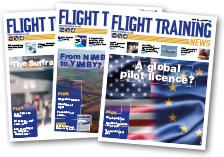‘Self-declaration’ medicals for holders of UK Private Pilot Licences (PPL) and National Private Pilot Licences (NPPL) are set to become a reality in late August, the new system will replace the requirement to obtain a medical from a doctor or medical examiner. The change is contained in legislation due to be enacted in the next few weeks, an advance copy of which has been seen by FTN.
Currently pilots with a NPPL licence are required to comply with DVLA group 1 or 2 standards and have their self-declaration of fitness countersigned by their GP. Holders of a UK PPL currently need at least an EASA ‘PART-MED’ class 2 medical or the NPPL medical requirements if they only use the privileges of an NPPL licence.
The change was subject to a CAA consultation and the CAA say that the move will lead to cost and time savings for pilots and, in most cases, remove the need for General Practitioner (GP) or Authorised Medical Examiner (AME) involvement in the process. The CAA have previously confirmed that 96 percent of those responding to the consultation agreed with the proposal.
The new medical requirement for UK private pilot licence and national private pilot licence holders is to be able to meet the same standard as that required to hold a DVLA Group 1 Ordinary Driving Licence (ODL). Existing medical options (for example a UK declaration with GP counter signature) will remain available. The same options will also be available for private balloon pilots.
To take advantage of the change, pilots will need to complete a form on the CAA website to declare that they meet the DVLA medical standard. Pilots under 70 will need to do this once while pilots over 70 must confirm their declaration every three years.
The new UK legislation applies only to holders of a UK PPL or NPPL issued by the UK CAA
The CAA say that change is supported by a study of the risks associated with GA flying, together with a review of the causes of light aircraft accidents and the likelihood of these being triggered by a pilot being medically incapacitated. The risk to third parties was considered and the regulatory approach taken by the Federal Aviation Administration (FAA) in the USA, which closely mirrors the UK proposal, was also reviewed. The FAA has recently announced a similar move on PPL medicals.
The new UK legislation applies only to holders of a UK PPL or NPPL issued by the UK CAA, but not professional pilots nor holders of an ‘EASA’ or ‘JAR’ PPL issued by the UK CAA, and not to pilots wanting to use the privileges of an Instrument Rating (IR). The new legislation states that the holder of a UK PPL or NPPL can make a medical declaration if they:
(a) reasonably believe that they meet the medical requirements for a Group 1 Licence issued by the Driver and Vehicle Licensing Agency (DVLA); and are not subject to a ‘disqualifying medical condition.’
(b) make a declaration to that effect to the CAA; and
(c) in the case of a licence holder aged 70 years or more, have made such a declaration within the previous three years.
A “disqualifying medical condition” is defined as any physical or mental condition or illness, or any history of such a condition or illness, including:
(a) any alcohol or drug abuse, addiction or misuse;
(b) any neurological condition;
(c) any functional disability;
(d) any surgery or medical treatment;
(e) any collapse, fainting or loss of consciousness;
(f) any history of (a) to (e); or
(g) such other medical conditions as the CAA may specify, that might “impair the safe operation of normal flight controls or render the licence holder unfit at any time to perform any function for which the licence is granted.”
There are additional restrictions which apply to pilots without a medical certificate. Flight by a pilot using the ‘self-declaration’ procedure is restricted to:
(a) aircraft with a maximum take-off mass of 5,700kg or less;
(b) not more than three passengers on board;
(c) by day or when exercising the privileges of a night rating;
(d) in visual meteorological conditions (VMC) or when exercising the privileges of an instrument meteorological conditions (IMC) rating; and
(e) within the UK only unless the holder has specific permission for the airspace in which the aircraft is being flown.
Additionally, to exercise night rating privileges, the pilot must meet the colour vision requirements of MED.B.075 of Part-MED.







